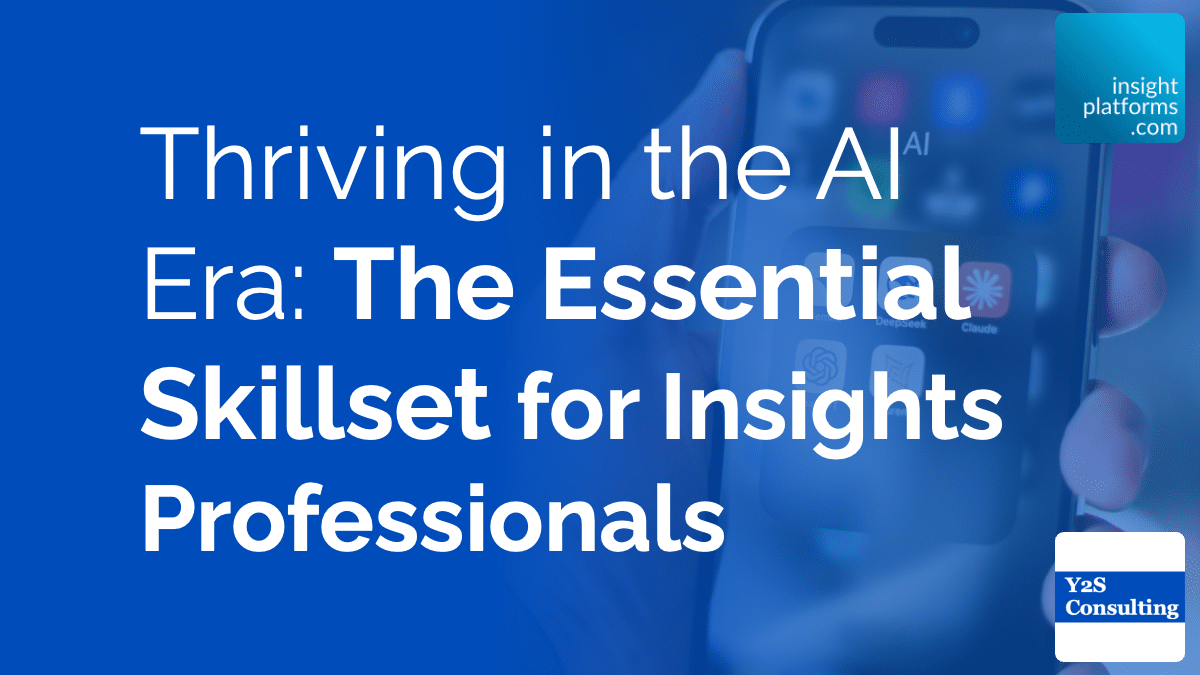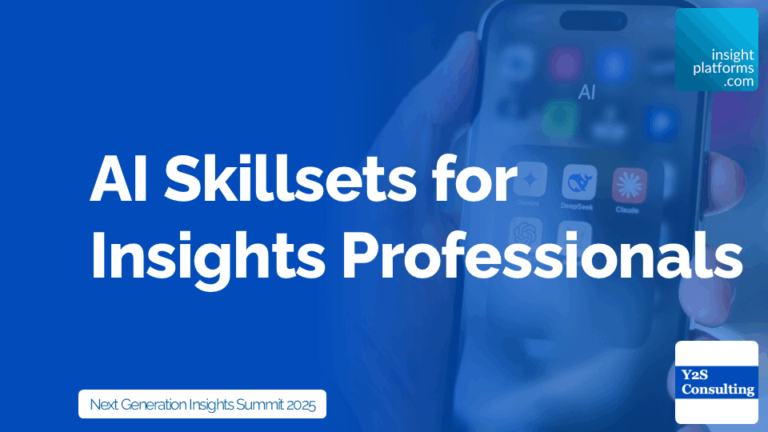
Thriving in the AI Era: The Essential Skillset for Insights Professionals
By Y2S Consulting
- article
- AI
- AI Agents
- Generative AI
The insights profession is experiencing a fundamental transformation driven by AI. While much attention focuses on AI’s efficiency benefits, the real opportunity lies in developing new capabilities that enhance strategic value creation. It comes down to adapting and making the most out of this opportunity.
This article is based on Yogesh Chavda’s webinar presentation. Watch the full webinar replay here:
AI Skillsets for Insights Professionals
This evolution requires insights professionals to master seven essential skills that go beyond basic AI literacy.
1. AI Tool Fluency
Modern insights professionals need proficiency in a new generation of AI-powered tools that enhance communication and analysis. Tools like Gamma are revolutionising presentation development, allowing researchers to create sophisticated, visually compelling decks in minutes rather than hours. The platform enables rapid visualisation of data and seamless template customisation while maintaining brand consistency.
Knowledge management has also evolved with tools like NotebookLM, transforming how insights professionals store and retrieve information. This platform enables the conversion of various content formats into searchable, interactive resources, effectively addressing the common challenge of insights being lost in forgotten folders or lengthy presentations.
Digital avatar technology, exemplified by platforms like HeyGen, offers new possibilities for presenting research findings. These tools allow the creation of professional video content in multiple languages, making insights more accessible and engaging across global organisations.
2. Prompt Engineering Excellence
Success with AI tools depends heavily on the ability to construct effective prompts. This skill goes beyond basic queries to include clear objective setting, proper formatting, and precise audience targeting.
Effective prompt engineering requires:
- Defining specific output requirements;
- Specifying the desired tone, format, and audience;
- Iterative refinement based on results.
3. Developing Agentic Thinking
The concept of agentic thinking involves understanding how to connect multiple AI agents to solve complex research challenges. This approach enables the creation of automated workflows that can handle tasks from initial concept development through to final analysis.
For example, connecting different GPT agents can automate processes like:
- Customer segmentation;
- Concept generation;
- Insight synthesis and reporting.
4. Data and Context Fusion
Modern insights work requires the ability to integrate multiple data sources while maintaining contextual relevance.
This skill involves:
- Combining quantitative and qualitative data sources;
- Integrating real-time and historical data;
- Maintaining context across different data types;
- Creating coherent narratives from diverse sources.
5. Simulation and Digital Twins
The emergence of simulation capabilities and digital twins represents a significant advancement in research methodology. These tools simply need to be customised to your industry and specific needs.
These capabilities enable:
- Creation of detailed persona simulations;
- Virtual testing environments for concepts and messaging;
- Predictive modelling of market responses;
- Competitive reaction simulation.
Platforms like virtway demonstrate how these tools can be applied to training scenarios and customer experience testing.
6. Strategic Storytelling
AI tools have transformed how insights professionals can craft and deliver stories. They can identify potential challenges, anticipate questions, and ensure presentations achieve their objectives by analysing content, tone, visuals, and narrative structure.
Key aspects include:
- AI-assisted presentation structure optimisation;
- Automated critical assessment of content;
- Preparation of response strategies for potential questions;
- Real-time presentation feedback and improvement.
7. Judgment and Ethics
As AI usage increases, ethical considerations become paramount.
Essential areas of focus comprise:
- Identifying and mitigating potential biases;
- Ensuring transparency in AI-assisted research;
- Managing synthetic data responsibly;
- Developing appropriate governance frameworks.
Key Takeaways
Success in the AI era requires insights professionals to move beyond viewing AI as merely an efficiency tool.
The path to mastering these skills begins with experimentation and curiosity. While the learning curve may seem steep, the potential for enhanced value creation makes this journey essential for those who aim to remain relevant and impactful in their organisations.
The key is to start small, but to start now. Identify a pilot project, begin experimenting with available tools, focus on helping your organisation become future-ready, and share successes to build momentum.


